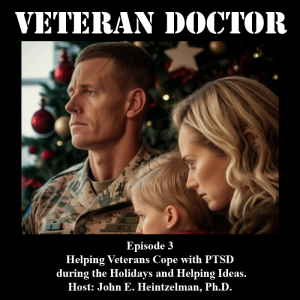
Veteran Doctor - Episode 3 - Helping Veterans Cope with PTSD During the Holidays & Helping Ideas
 2020-12-15
2020-12-15
Good Morning Veterans, Family, Friends, and Everyone else who wants to listen in on the THIRD EPISODE of the Veteran Doctor Podcast. My name is John and I will be your Host. On this week’s Podcast, we will be discussing the helping veterans cope with PTSD during the holidays & helping idea.
The winter holiday season is regarded by many as a wonderful time of the year. Consequently, for many veterans, this time of the year is often filled with non-celebratory memories from past experiences. Add PTSD to the mix – 11-20% of Veterans who served in Operations Iraqi Freedom (OIF) and Enduring Freedom (OEF) have PTSD in a given year – this making the “season to be jolly” downright challenging. The holidays can be a painful reminder of past times when life seemed better. Large groups of family and friends are often part of the holiday festivities, but this and other things may be stressful for someone with Posttraumatic Stress Disorder (PTSD).
Groups of people and friends may tire a person out or make him, or her feel overwhelmed. People may feel pressure to join family activities when they’re not up for it or believe they must act happy when they’re not. People with PTSD may already find it challenging to get enough sleep or relax, and these added pressures can worsen those symptoms.
Veterans with PTSD may be susceptible to losses around the holiday. Veterans and military families, in particular, tend to remember at the holidays those who did not make it home from war. They may not know how to celebrate the holidays, knowing those fallen heroes are no longer present. There may also be recent losses: the death of a loved one, an emotional divorce, or separation from one’s children. All of these circumstances may cause someone to feel melancholy about memories of holidays past.
Family and friends might ask the Veteran questions about his or her life or about PTSD. The person with PTSD may not feel comfortable answering these questions, but they must keep in mind that their family may feel some of the same pressures and may only be asking because they have a genuine concern for their wellbeing.
The holiday gathering may also be one of the few times family or friends can physically see the person with PTSD, and they may feel it is more appropriate they ask such questions in person rather than over the phone or online because they may think that is too impersonal. In either case, the person with PTSD has the power and right not to answer any questions.
More Episodes
 2023-05-06
2023-05-06
 188
188
 2023-05-06
2023-05-06
 11
11
 2023-04-15
2023-04-15
 19
19
 2023-04-15
2023-04-15
 11
11
 2021-11-19
2021-11-19
 70
70
 2021-06-25
2021-06-25
 63
63
 2021-06-06
2021-06-06
 25
25
 2021-06-05
2021-06-05
 32
32
 2021-05-02
2021-05-02
 42
42
Create your
podcast in
minutes
- Full-featured podcast site
- Unlimited storage and bandwidth
- Comprehensive podcast stats
- Distribute to Apple Podcasts, Spotify, and more
- Make money with your podcast
It is Free
- Privacy Policy
- Cookie Policy
- Terms of Use
- Consent Preferences
- Copyright © 2015-2024 Podbean.com





